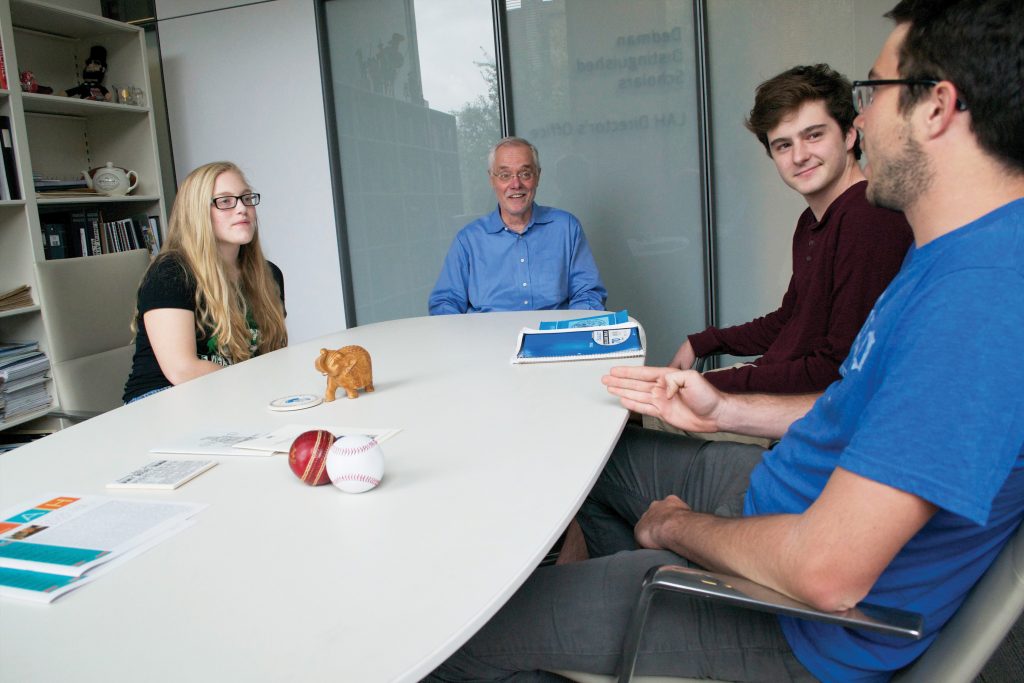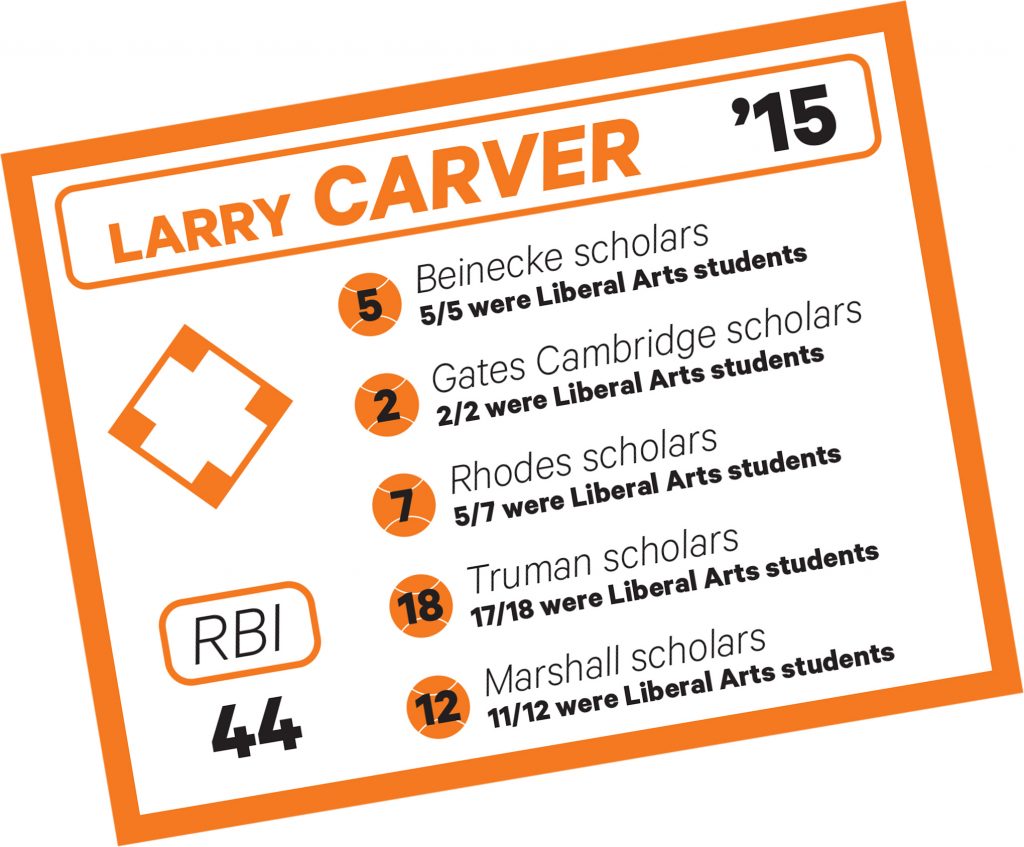Larry Carver’s Got a Marshall on First, a Truman on Second and a Rhodes on Third
It’s been more than 20 years since Larry Carver began working with UT Austin students applying for the nation’s most prestigious graduate school fellowships, and he can still tell you the names of all the nominees from memory.
It’s a long list — one that includes more than 100 finalists and 44 winners.
“For me to work with these very gifted students, it makes me a better person,” says Carver, who holds the Doyle Professorship in Western Civilization and serves as director of Liberal Arts Honors. “It’s certainly brought a great deal of joy into my life. When I look back at the various things I’m proud of at the university, this is certainly one of them very high on my list.”
Under Carver’s tutelage, UT Austin has become one of the nation’s fiercest competitors for elite scholarships such as the Gates Cambridge scholarship, Beinecke scholarship, Truman scholarship, British Marshall scholarship and Rhodes scholarship. His impact is immeasurable. In his 42 years at the university, he has worn so many hats that he jokes the only one left has a wide brim and a “T” stamped across it.
“I’ve had a lot of different jobs at the university. I was assistant to the chancellor, associate dean, assistant to President Livingston, acting director of admissions,” Carver says. “The job I’d really like is — when Augie Garrido steps down — I’d like to be acting coach of the baseball team. I think that’d be terrific. I’ve got a great passion for baseball.”

The College of Liberal Arts shouldn’t be too worried about losing one of its most exuberant educators to the baseball diamond, however. Carver discovered early on that even if things don’t turn out exactly as planned, they have a way of working out.
“I really see my job as being a coach,” he says. “When I was growing up, I always thought I’d be one — I was an avid athlete in high school and played a little bit of college baseball. And in some sense that’s what I became. It’s just a different kind of coaching — coaching academics rather than coaching athletics.
“It’s not a bad way of thinking about your relationship with the students and what you’re trying to get them to do,” he adds. “You’re assessing their abilities, and where they are and what they might be able to do if they did this or improved that.”
Mark Jbeily, a Plan II senior, is a student with whom Carver has worked closely during the past few years. He is a 2015 Marshall scholar and a 2014 Truman finalist.
“Dr. Carver has long been a mentor and friend to me,” Jbeily says. “His passion for learning is infectious, and he is always willing to take the time to have a great conversation about anything.
“He settles for nothing less than excellence” Jbeily adds. “Working with him has pushed me to never settle for anything but my best. Even if I had not been named a Marshall scholar, I would have been very grateful for all the help and guidance he gave me throughout the process. He pushed me to think deeply about how I can use my talents and passion in service of others.”
If Carver had to play favorites, he says he’d have to pick the Truman scholarship. Since he took over the university’s Truman committee, UT Austin students have won it 18 times, putting the university second in the nation among state universities.
“That’s the scholarship that’s really dear to my heart, because it’s who we are as Americans,” Carver says. “It’s about young people who want to go into public service. There are about 60 awarded each year across the nation, and it’s a very arduous application, so you really are working with the student over a 6-month period trying to get the application right.”
Students who apply for national fellowships with Carver’s assistance get an experience that’s life changing no matter the outcome. With one-on-one writing revision sessions, in-person interview coaching and exemplary letters of recommendation, they pick up skills that help them throughout their professional lives. Not to mention the sense of direction they gain by seriously discussing the paths they want their lives to take after graduation.
Having a liberal arts education is a key ingredient to competing for a national fellowship, according to Carver. Of the 44 winners during his tenure, 40 had liberal arts backgrounds.
“Liberal Arts is really the engine that fuels this,” Carver says. “The ability to write is so important. The ability to articulate your goals in a very clear fashion. That really strong liberal arts background and having a broad vision of society and society’s needs, coupled with an expertise is just hugely, hugely important.
“Even the students who don’t win — they learn so much going through the process,” Carver says. “It’s almost like a miniature liberal arts education for them, because they’re trying to figure out who they are, what’s important in their lives, what they really want to do and how to articulate that in the most powerful way possible.
“It’s education at its best,” he adds. “I think it’s really important for the university. Is everybody going to win a Rhodes scholarship? No. Should all of our students aspire to be a Rhodes scholar? Yes!”
Because Carver spends so much time with the nominees, he writes their official endorsement letters from the university. It’s a delicate balance to strike. He must represent each student in a way that represents his or her strengths without seeming too hyperbolic. Over the years, Carver’s careful work has paid off, and the scholarship foundations have taken note.
“They know that The University of Texas is not going to nominate someone who can’t win, so there’s a kind of integrity that you build over time,” Carver says. “They know when you write a letter of recommendation that you really mean it.”
The passion and effort Carver puts into his coaching hasn’t gone unnoticed by other schools. The University of North Carolina at Chapel Hill — a chief rival — once called Carver. They were curious about how UT Austin has achieved so much success — what was Carver’s budget? How big was his supporting staff? He just laughed and told them he didn’t have either.
“Dr. Carver sets high standards for himself and others,” Jbeily says. “He pours himself into these applications so students grow no matter what the outcome. He is simultaneously a teacher, a critic, a cheerleader and a friend. And for that, UT is very lucky to have him.”

